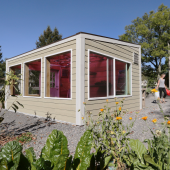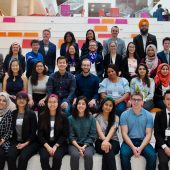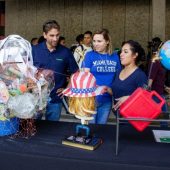
The inspiration for this article came initially from the striking presence of the Pōhutukawa here in Aotearoa during summer combined with the profound experience of undertaking an ancestral journey with my mother along the East Coast, an area of special significance to my iwi (tribe). The journey sparked a number of personal and professional reflections which led to me undertaking some research on the bio-physical and linguistic origins of the Pōhutukawa. This article outlines these as well articulating three principles arising from these reflections which I have continue to apply to my sustainability education endeavours in the 2019 Year of Indigenous Languages and beyond.
Continue Reading
This case study describes a student-led campus sustainability initiative to design and implement a power-generating greenhouse at Allegheny College. The design of the greenhouse was carried out by students in collaboration with professionals in a variety of learning settings including research seminars, independent studies, paid internships, and senior thesis projects. By providing a detailed account of the student-driven design process and structuring the analysis around a framework of documented sustainability competencies, this paper identifies challenges and opportunities for utilizing living labs for sustainability education. Researchers observed that students who contributed to greenhouse development in multiple capacities developed several sustainable competencies. The project also demonstrates the difficulty of engaging students in both the planning and implementation stages of multi-year efforts. While the student-led design process introduced new logistical challenges, deep levels of student commitment and unique student backgrounds were critical to the greenhouse project’s success.
Continue Reading
The Calgary Interprofessional Challenge (CIC) engages university students across disciplines in a novel 44-hour hackathon based on faculty and peer-to-peer interprofessional education. CIC uses short introductory talks on problem-solving in different faculties, a series of workshops, and expert mentorship from university faculty, relevant specialists, and entrepreneurs as its core curriculum. A recent offering of CIC used the campus as a learning lab by focusing on a sustainability challenge at our university. The CIC model can be replicated at other campuses to advance sustainability, while cultivating interprofessional and sustainability practice competencies such as stakeholder engagement, group collaboration, and understanding of different worldviews and relationships.
Continue Reading
A semester-long ESL curriculum centered on the impacts of climate change was conceptualized and implemented at a community college English for Academic Purposes program in South Florida during the 2018-2019 academic year. After reading the 2018 IPCC report, a sense of urgency led to assembling and developing relevant materials, applying and extending lesson plans, creating collaborative projects to foster student engagement, and participating in professional development to help students acquire the necessary language skills and climate change-related content knowledge they need to understand and address the challenges their community is facing.
Continue ReadingAs schools provide students with choice, support the development of critical thinking skills and promote project-based learning, incorporating a focus on sustainability is a natural progression of the learning process. In 2012, the US Department of Education (DoE) developed a federal outreach initiative entitled Green Ribbon Schools (GRS) that promotes sustainability, healthy living, and collaborative efforts. The catalyst behind this initiative was a group of non-profit organizations, including the Center for Green Schools at the U.S. Green Building Council (USGBC). This research focuses on case studies of K-6 schools that have been awarded the Green Ribbon School designation and how these schools build a foundation for adopting and continuing sustainable principles. Specific K-6 schools were identified and teachers and administrators from those schools were interviewed as to how they incorporated the three pillars of green ribbon schools (reducing environmental impact, improving health and wellness and offering effective environmental and sustainability education) into their existing curriculum and physical structure. Nine thematic categories were found to be the driving factors that supported the GRS success in their sustainable policies. The themes from this research help to articulate the conditions needed to create and advance sustainability initiatives.
Continue Reading
Although higher education institutions are being encouraged to reorient their curricula to address sustainability, not everyone accepts the tenets of the United Nations’ mainstream approach to education for sustainable development (ESD), especially David Selby. This paper recounts intellectual gold nuggets garnered from critically reading his scholarship about education for sustainable contraction to counter climate change and global heating (instead of global warming). His ideas are deemed both enticing and disconcerting but apropos for these ‘interesting times.’ They provide a way for people to walk a different path than mainstream ESD one that respects transience, contraction, moderation and sustainability. This can best be achieved by deep education leading to deep, quantum learning so people can engage with the fears and truths staring them in the face. The thoughts shared in this paper should resonate with educators, politicians, industry leaders, civil society and the media.
Continue Reading